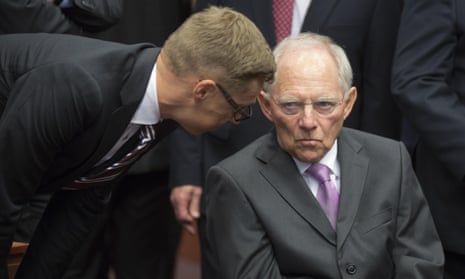Five years from its inception, the world’s biggest bailout of a sovereign state will grind to an excruciating halt on Tuesday, theoretically leaving Greece high and dry and on its own under a leftwing government bitterly accusing the EU elite of deliberately using the country as a neo-liberal laboratory.
If the experiment has been a disaster for Greece, it is also a colossal failure for Europe, with the result that at the very apex of leadership the EU nowadays resembles an unhappy assembly of squabbling politicians locked in what could not be called an “ever closer union”.
Take just the last few days. On Thursday leaders at a summit contemplated formally for the first time, however briefly, the prospect of Britain leaving the EU. By three o’clock on Friday morning they were all at one another’s throats in an unseemly quarrel over who should take part in accommodating a mere 40,000 refugees from Italy and Greece over two years, and on what terms. On Saturday, 18 governments of the eurozone cut Greece off and initiated a process that could end in pushing Athens out of the currency and perhaps out of the union.
Three days, three crises, and a collective performance that inspires little hope or confidence in their crisis management.
The air is already thick with recrimination, not just between Greece and the rest of Europe, but among the Europeans. France says that Greece must be saved, Germany says impossible. The European commission is seeking to revive negotiation that are on their deathbed. The Finnish finance minister, Alex Stubb, is looking forward to the funeral. The International Monetary Fund is at odds with the Europeans over the levels of Greek debt.
Everywhere there is the sight of leaders seeking to escape responsibility for a sorry state of affairs. For weeks, in anticipation of the criticism certain to be directed at them in the event of a Greek collapse, senior German figures have privately been saying: “Well, nobody will be able to say that we did not try our best.”
At the meeting of eurozone finance ministers on Saturday that ended the Greek bailout, the French finance minister, Michel Sapin, was the only one with enough humility to remark that maybe the Europeans had got some things wrong and that things might have been done differently, according to witnesses.
The IMF has argued internally for at least three years that the organisation was breaching its own rules by taking part in a bailout that held out little prospect of achieving the debt sustainability the fund’s rescues prescribe. Christine Lagarde, the IMF chief, ignored the advice of her own experts and remained in the failing project.
Following the calling of the Greek referendum, the collapse of the negotiations and the end of the bailout on Saturday, the European commission, keen to salvage the situation while diverting blame, stated publicly for the first time on Sunday that the proposed deal would have included a form of debt relief for Greece, prime minister Alexis Tsipras’s central demand.
“The understanding of all parties involved was that [Saturday’s] Eurogroup meeting should achieve a comprehensive deal for Greece, one that would have included not just the measures to be jointly agreed, but would also have addressed future financing needs and the sustainability of the Greek debt,” a commission statement said.
Berlin will not wear that any time soon. According to people present, Wolfgang Schäuble, Germany’s finance minister, told his eurozone counterparts there was no way he would risk taking a Greece bailout proposal to the Bundestag at this stage, especially when Tsipras had roundly rejected it.
“We would have to say to our population and parliament that [the Greek] government would do what it is obliged to do in the programme, although it just recommended that people should not accept it,” he then told German TV.
Eurozone leaders ooze confidence that Greece’s financial collapse could be easily weathered by the rest of the currency bloc. No one really knows how the chaos, likely if Tsipras wins his referendum on Sunday, will affect the rest of the zone economically and financially. But it is political poison.
For Europe’s leaders, five years of failure in Greece mean that everyone’s a loser.
